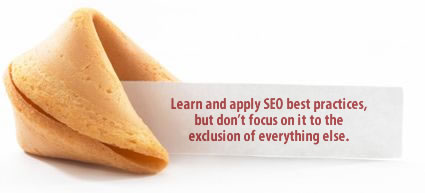Love Letters to Google: Hit Counters Don’t Buy Anything
“Yeah, yeah, yeah… we’re the good guys, don’t be evil, yadda, yadda, yadda. We get it. Now let’s get down to brass tacks; how do I optimize my website for search engines?”
Sorry but we’re not quite there yet. Almost, but not quite. And if you’re in that big of a rush, you’re in the wrong game altogether. Search Engine Optimization is about calm, Zen patience. More on that later, but for now just sit back and relax.
While you’re in your tranquil and peaceful state, ponder this little koan: “The best way to optimize your SEO is to not think about SEO.” Most people who hear that line roll their eyes and slump their shoulders in resignation. They believe that the implicit suggestion is to do nothing and let the chips fall where they may. That is not the take-away, here.
The lesson is that most people, upon deciding to investigate SEO, put on their war face and get a little crazy. They start thinking only in terms of SEO. Then the whole website becomes one big love letter to Google and the living, breathing humans who visit the site suffer as a result. The site isn’t engineered for dumb, squishy humans, after all… it’s optimized for search engines. So, because all too many people see SEO as the end-all-be-all, let’s take a step back and see how SEO fits into the whole.
Ultimately, a website serves a specific purpose; generally to sell something, impart something, exchange something, collect something or any combination of the four. The problem with treating SEO as the end game is that search engines don’t buy, learn, trade or offer anything. Search engines aren’t your customers. People are. As such:
The most important thing you can do
for your site is optimize it for human interaction.
The reason for this is two-fold. First, the easier it is for people to do what you want them to do, the more likely they are to do it. That probably sounds pretty obvious at this point, but it’s easy to lose sight of that mission while caught up in the dark machinations of SEO.
Secondly, as always, Google knows what’s up. Google wants to deliver people to sites that are easy to use and engineered for humans, because if Google sends a person to a site they enjoy, they like Google all the more. If Google sends a person to a site that is frustrating and obtuse, that person becomes a little less thrilled about their Google experience, and Google ain’t havin’ none of that.
Think of Google, in part, as a kind of Turing Test. If a site looks like it was designed to interface gracefully with dumb, squishy humans, Google likes the site all the more. If it looks like it was designed to pleasure Googlebot, well… Google’s not as big a fan of that as you’d think. How does Google know if a site is optimized for human interaction? Like I said in the previous chapter: legions of geniuses with unlimited resources.
All that being said, while SEO is important in order to get people to visit a website, it is more important that the site caters to visiting humans. So, by all means, learn about SEO. But don’t be afraid to explore the topics of Human Experience Optimization and User Experience Design. Go ahead and Google those terms. If you learn anything, you can thank White Hat SEO.
